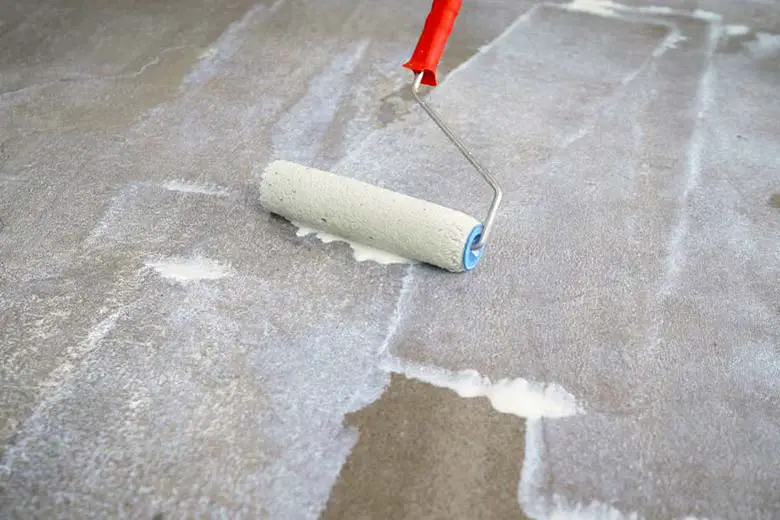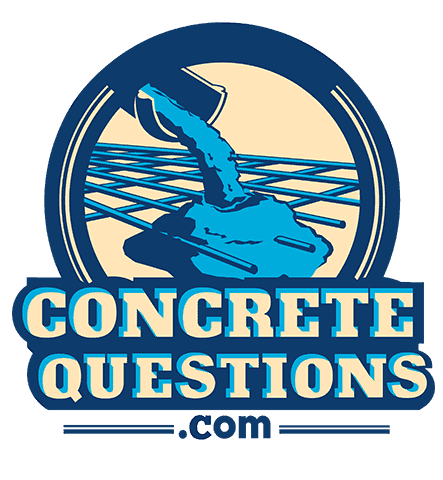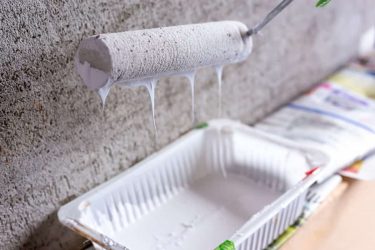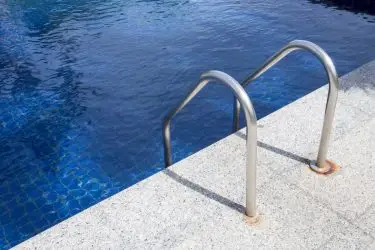Maintaining concrete slabs can be a hassle because they often get damaged by weather elements, abrasion, water, oil, grease stains, and de-icing salts. If you’ve heard of concrete sealers, then you probably know that’s what they’re made to prevent. But do they darken concrete in the process?
Some concrete sealers will darken concrete but all are made to beautify and protect slabs. Solvent-based sealers darken concrete through a process called color saturation. However, using water-based sealers is a sure-fire way of retaining the color of decorative concrete.
Read on for more information on what you should consider when buying concrete sealers, as well as the different types of sealers and how to apply a concrete sealer. We’ll also discuss its common decorative problems and how to avoid them.

Table of Contents
What To Look For in Concrete Sealers
Before picking a specific sealer, you might want to think about the alternatives, their pros, and their cons. If you’ve been using them for a while, that might be an easy decision. However, if you’re a new buyer, you may be wondering: What exactly should you look for?
Here’s a detailed breakdown of what you should consider when buying concrete sealers:
Safety Properties
You need to consider the sealer’s slip resistance properties, whether there are open ignition sources close to the installation area, whether the area is prone to being wet, and the slope and texture of the surface being sealed. In this case, you should buy a slip-resistant sealer, as it would be unpleasant to be sued for causing slip and fall accidents due to negligence!
Besides, if the surface being sealed is in close proximity to areas that have open flames, welding equipment, or smoking zones, you will need non-flammable sealers.
Appearance of the Finished Surface
One of the reasons you need concrete sealers is because you want the finished surface to look glossy and beautiful.
However, the appearance of the finished surface depends on the type of resin in the sealer you choose, as some coatings range from matte to high gloss. Notably, matte and satin finishes appeal to most people since they give natural looks and are better at concealing scratches, scuffs, and dirt compared to glossy coatings.
Performance
Let me illustrate this point with a hypothetical situation:
John decided to buy a concrete sealer because it had an attractive appearance and he was happy with its non-flammability. He hoped it would provide that matte look on concrete surfaces for several years.
However, that didn’t happen. The sealer started scraping off after some months, and John had to spend more maintaining it. Eventually, John discovered there was a better sealer that kept surfaces in tip-top shape for years.
John’s situation indicates two aspects that you’re likely to overlook when buying a concrete sealer, which are durability and maintenance.
In a nutshell, you should pick a sealer that provides durable coating and will lower your costs, as low-quality sealers can be more expensive over the long term.
To help you choose, here are some of the best concrete sealers to buy.
Types of Concrete Sealers: Acrylic vs. Penetrating
There are several types of concrete sealers on the market, the most notable ones being acrylic and penetrating sealers. Although both do the same job, they seal concrete in different ways.
Acrylic Sealers
When you apply an acrylic sealer, you simply add a protective film on top of the concrete. The film uses the same principle as a raincoat, which is to protect the bottom layers by providing a water-proof barrier.
Subject matter experts state that one of the most common myths about acrylic sealers is that they penetrate concrete deeper when diluted with xylene. Acrylic particles usually have a fixed size and cannot be made smaller using a liquid. When you add xylene to these sealers, it simply flows through, leaving the solid particles on the top of the surface.
In fact, you risk spreading the particles further apart and ending up with an ineffective barrier when you do that.
Acrylic sealers are either solvent-based or water-based. In both cases, you get acrylic solids suspended in the accompanying liquid, and when you apply the sealer to a slab, the liquid carrier evaporates or dries, leaving the solid particles to form a film on the surface.
Generally, you’ll notice that most solvent-based sealers have an offensive odor. Besides, some of them are hazardous and can ignite and explode.
For that reason, water-based sealers are better for this purpose since they are not flammable, are odorless, and do not emit hazardous fumes.
However, solvent-based sealers are glossier and darken the surface, providing better contrasts. In contrast, water-based ones are ideal if you want a matte finish with some touch of gloss.
This Masonry Defender Garage Floor Sealer on Amazon is worth trying out, as it provides a durable, low-odor finish and comes with a non-slip additive to reduce slip hazards.
Penetrating Sealers
Penetrating sealers do not form a coating, but rather, they contain silicates that react with the concrete to coat your slabs’ pores with a water-resistant substance.
Concrete treated with a penetrating sealer retains its colors, as it neither darkens nor attains a glossy appearance.
Because of that, you can use penetrating sealers to reseal plain brushed concrete, especially if you want to retain its natural appearance.
If you prefer a penetrating sealer, try this Rain Guard Water Sealers Concrete Sealer on Amazon. It protects your slab from damage by the elements for up to five years, is resistant to UV degradation, and prevents efflorescence (when you get white stains on the concrete).
How about the best of both worlds? In that case, you can use the Alliance Gator Hybrid Seal Low Gloss on Amazon. It’s made of high-grade acrylic and penetrates deep into your slab’s pores, reducing oil and dirt penetration while protecting surfaces from corrosion by de-icing salt.
This video explains the types of concrete sealers in detail:
How To Seal Concrete
Sealing concrete is an easy, quick process that can be completed within a few hours if done correctly.
Here’s a summary of the key steps to follow:
- Remove all stains, dirt, oil, or grease from the slab. Here are some tips on how to remove stains from concrete.
- Strip all existing sealers from the concrete, if any.
- Use an etching solution to open up the concrete.
- Using a roller or a sprayer, apply a thin coat of the sealer on your slab in one direction and wait for it to dry.
- Once the first layer dries up, apply another coat in the opposite direction.
- Allow the coating to dry before stepping on your concrete.
Caveat: These are the general steps to follow. Ensure you check the specific instructions by the sealer’s manufacturer. Hire a professional to help if necessary.
Do you need more detailed instructions? Read our complete guide on how to seal concrete in 7 easy steps.
4 Common Decorative Concrete Sealer Problems
Just because you’ve successfully sealed your slab does not mean you won’t face any challenges. In fact, here are four of the problems to expect and how you can prevent them:
- Sealer bubbles: This arises from over-applying a sealer, but you can avoid it by applying thin layers of sealers.
- Solvent-based sealer whitens, peels, or flakes off: This occurs when you apply a sealer to a wet slab of fresh concrete that contains bleed water or from over-application. To avoid it, you should follow the manufacturer’s instructions, especially on the coverage rate, how to prepare the surface, and the number of coats to apply.
- Water-based sealer is white or powdery: This occurs if you apply the sealer under cool temperatures or very humid conditions, which can be avoided by following the manufacturer’s recommendations.
- Sealers getting stained by oil, leaves, etc.: You can add a urethane coating system. However, ensure it’s suitable for exterior use if you intend to apply it on outdoor slabs.
Conclusion
Your desire is to protect your slabs from the elements and make them beautiful to look at, and concrete sealers do precisely that.
Nonetheless, as you pick sealers, you should always consider how long they last, whether they’re safe to use near the surfaces you intend to apply them on, and their appearance.
If you prefer to darken your slabs, you may use solvent-based sealers. However, if you only wish to protect concrete surfaces without changing their appearance, you can use penetrating sealers.
Whichever choice you make, ensure you follow the manufacturer’s guidelines for optimum results.



